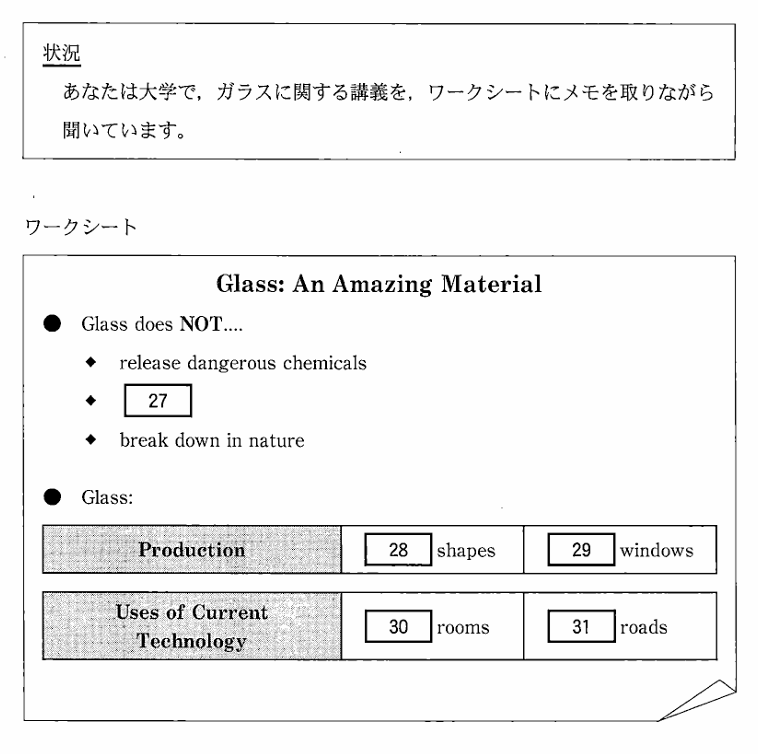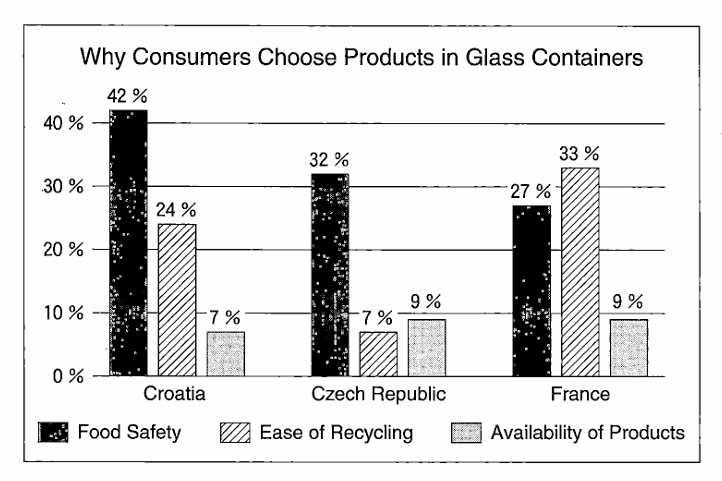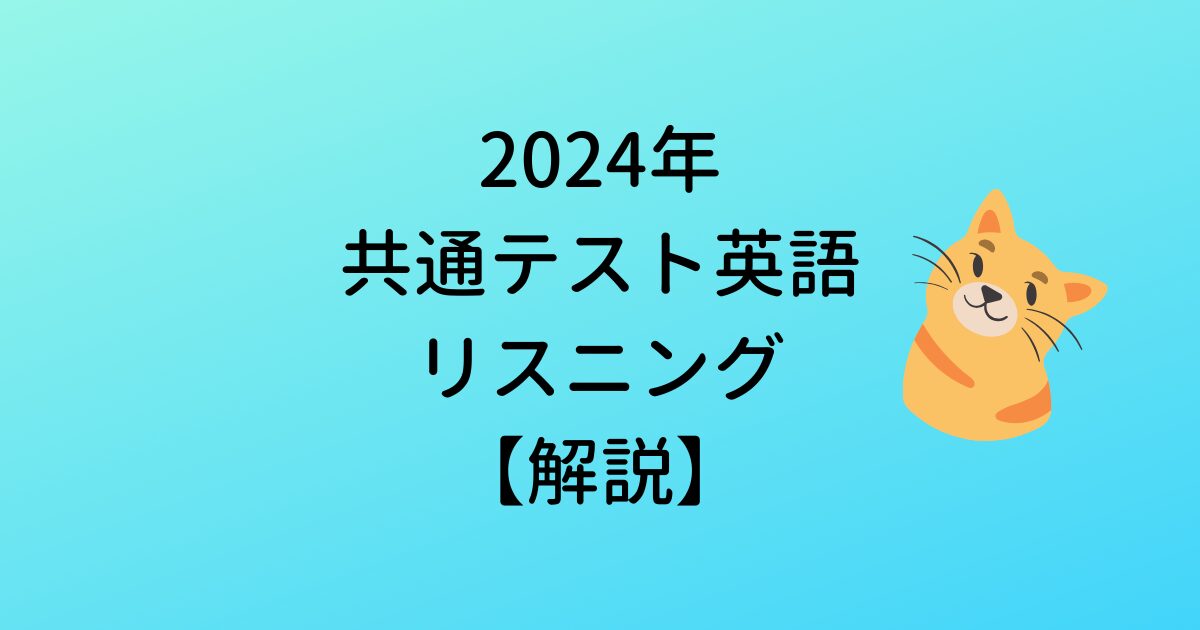問題
第5問は17:33から
第5問は問27から問33までの7問です。
最初に講義を聞き、問27から問32に答えなさい。次に続きを聞き、問33に答えなさい。

問27 ワークシートの空欄( 27 )に入れるのに最も適切なものを、四つの選択肢のうちから一つ選びなさい。
- allow for repeated recycling
- have unique recycling qualities
- keep bacteria out of medicine
- permit bacteria to go through
問28~31 ワークシートの空欄( 28 )~( 31 )に入れるのに最も適切なものを、六つの選択肢のうちから一つずつ選びなさい。選択肢は2回以上使ってもかまいません。
1. Adjust sound in
4. Improves safety of
2. Arranged in
5. Reflects views of
3. Blown into
6. Spread into
問32 講義の内容と一致するものはどれか。最も適切なものを、四つの選択肢のうちから一つ選びなさい。
- Glass has been improved in many ways by technology for modern life.
- Glass has been replaced in buildings by inexpensive new materials.
- Glass is a material limited in use by its weight, fragility, and expense.
- Glass is a modern invention necessary in many aspects of our daily life.
問33 講義の続きを聞き、次の図から読み取れる情報と講義全体の内容からどのようなことが言えるか、最も適切なものを、四つの選択肢のうちから一つ選びなさい。

- Glass can be recycled repeatedly, but “ease of recybling” is the least common reason in the Czech Republic and Croatia.
- Glass is harmful to the environment, but “food safely” is the most common reason in the Czech Republic and Croatia.
- Glass products are preferred by half of Europeans, and “ease of recycling” is the most common reason in France and Croatia.
- Glass products can be made using ancient techniques, and “availability of products” is the least common reason is France and Croatia.
解説 問27~32

This afternoon, we’re going to talk about the unique characteristics of glass and recent innovations in glass technology. Glass does not release any dangerous chemicals and bacteria cannot pass through it, which makes it suitable for storing food, drinks, and medicine. Glass can also be cleaned easily, reused many times, and recycled repeatedly, making it friendly to the environment. A surprising characteristic of glass is that it doesn’t break down in nature. This is why we can still see many examples of ancient glass work at museums.
今日の午後は、ガラスのユニークな特徴とガラス技術の最近の革新についてお話しします。ガラスは危険な化学物質を放出せず、バクテリアも通過できないため、食品、飲料、医薬品の保管に適しています。また、ガラスは簡単に洗浄でき、何度も再利用でき、繰り返しリサイクルできるため、環境に優しい素材です。ガラスの驚くべき特徴は、自然界で分解されないことです。これが、博物館で古代のガラス細工の多くの例を今でも見ることができる理由です。
Glass-making began in Mesopotamia roughly 4,500 years ago. Beads and bottles were some of the first glass items made by hand. As glass-making became more common, different ways of shaping glass developed. One ancient technique uses a long metal tube to blow air into hot glass. This technique allows the glassblower to form round shapes which are used for drinking glasses or flower vases. Spreading hot glass onto a sheet of hot metal is the technique used to produce large flat pieces of window glass.
ガラス製造は、およそ 4,500 年前にメソポタミアで始まりました。ビーズやボトルは、手作りされた最初のガラス製品の一部でした。ガラス製造がより一般的になるにつれて、ガラスを成形するさまざまな方法が開発されました。古代の技術の 1 つは、長い金属管を使用して熱いガラスに空気を吹き込むことです。この技術により、ガラス吹き職人は、コップや花瓶に使用される丸い形を作ることができます。熱いガラスを熱い金属板に広げることは、大きな平らな窓ガラスを製造するために使用される技術です。
Today, new technology allows glass to be used in exciting ways. 3D printers that can make lenses for eyeglasses have been developed. Smart glass can be used to adjust the amount of light that passes through airplane windows. Other types of glass can help control sound levels in recording studios or homes. Moreover, tiny pieces of glass in road paint reflect light, making it easier to see the road at night.
今日、新しい技術により、ガラスはエキサイティングな方法で使用できます。眼鏡のレンズを作れる 3D プリンターが開発されました。スマートガラスは、飛行機の窓を通過する光の量を調整するために使用できます。他の種類のガラスは、レコーディングスタジオや家庭での音量を制御するのに役立ちます。さらに、道路の塗料に含まれる小さなガラス片は光を反射し、夜間に道路を見やすくします。
Due to these characteristics, glass can be found everywhere we go. Our first group investigated the use of glass in some European countries. Group 1, go ahead.
これらの特性により、ガラスは私たちが行くところすべてで見つかります。最初のグループは、ヨーロッパのいくつかの国でのガラスの使用を調査しました。グループ 1、どうぞ。
解説 問27
- Glass does NOT…. / ガラスは…をしない
- release dangerous chemicals / 危険な化学物質を放出する
- ( 27 )
- break down in nature / 自然界で分解される
ワークシートの( 27 )に入るものを選ぶ問題です。選択肢を確認しましょう。
1. allow for repeated recycling
繰り返しリサイクルできる
2. have unique recycling qualities
独自のリサイクル特性がある
3. keep bacteria out of medicine
細菌を医薬品から締め出す
4. permit bacteria to go through
細菌が通過するのを許可する
講義でこう言っています。
Glass does not release any dangerous chemicals and bacteria cannot pass through it
ガラスは危険な化学物質を放出せず、バクテリアも通過できない
ガラスはバクテリアを通過させません。ガラスがしないことを選ぶのですから、正解は「4」です。

ワークシートに「Glass does NOT….」となっていることに注意です。そこを見逃せば、「1」~「3」で迷ってしまいます。逆にそこさえ意識していれば、常識に照らし合わせても解答できそうです。
解説 問28~31
● Glass:
| Production | ( 28 )shapes | ( 29 )windows |
| Uses of Current Technology | ( 30 )rooms | ( 31 )roads |
ワークシートの空欄( 28 )~( 31 )に入れるものを選ぶ問題です。選択肢を確認しましょう。
1. Adjusts sound in
音を調整する
4. Improves safety of
安全性を向上する
2. Arranged in
配置をする
5. Reflects views of
景色を反射する
3. Blown into
吹き付ける
6. Spread into
拡散する
講義でこう言っています。
One ancient technique uses a long metal tube to blow air into hot glass. This technique allows the glassblower to form round shapes which are used for drinking glasses or flower vases.
古代の技術の 1 つは、長い金属管を使用して熱いガラスに空気を吹き込むことです。この技術により、ガラス吹き職人は、コップや花瓶に使用される丸い形を作ることができます
ガラスに空気を吹き込むことで形が作られます。「28」に入るのは「3」の「Blown into / 吹き付ける」です。
講義でこう言っています。
Spreading hot glass onto a sheet of hot metal is the technique used to produce large flat pieces of window glass.
熱いガラスを熱い金属板に広げることは、大きな平らな窓ガラスを製造するために使用される技術です
ガラスは広げられて「window」になります。「29」に入るのは「6」の「Spread into / 拡散する」です。
講義でこう言っています。
Other types of glass can help control sound levels in recording studios or homes.
他の種類のガラスは、レコーディングスタジオや家庭での音量を制御するのに役立ちます
「room」具体例として「recording studios or homes」が挙げられています。「control sound levels」と選択肢の「Adjusts sound」が同じ意味です。「30」に入るのは「1」の「Adjusts sound in / 音を調整する」です。
講義でこう言っています。
Moreover, tiny pieces of glass in road paint reflect light, making it easier to see the road at night.
さらに、道路の塗料に含まれる小さなガラス片は光を反射し、夜間に道路を見やすくします
これは道路の安全性を向上させる取り組みです。「31」に入るのは「4」の「Improves safety of / 安全性を向上する」です。
ということで、正解は( 28 )→「3」、( 29 )→「6」、( 30 )→「1」、( 31 )→「4」です。

「road」については、「reflect」という言葉に反応して「5」を選んだ人がいたかも。でも冷静になって考えれば、景色を反射したら危ないですよね。ただ内容までしっかり理解して解答するのは難しそう。これは消去法になるかも。
解説 問32
講義の内容と一致するものを選ぶ問題です。選択肢を確認しましょう。
1. Glass has been improved in many ways by technology for modern life.
現代の生活に対して、ガラスは技術によってさまざまな方法で改良されてきました。
講義にはこうあります。
Today, new technology allows glass to be used in exciting ways.
今日、新しい技術により、ガラスはエキサイティングな方法で使用できます
ガラスは改良されて、眼鏡のガラスや飛行機の窓など、様々な場面で使われるようになりました。この選択肢が正解です。
2. Glass has been replaced in buildings by inexpensive new materials.
建物では、ガラスは安価な新素材に置き換えられました。
そのような話はありません。この選択肢は違います。
3. Glass is a material limited in use by its weight, fragility, and expense.
ガラスは、その重さ、壊れやすさ、および費用のために使用が制限される素材です。
そのような話はありません。この選択肢は違います。
4. Glass is a modern invention necessary in many aspects of our daily life.
ガラスは、私たちの日常生活の多くの側面で必要な現代の発明です。
講義にこうあります。
Glass-making began in Mesopotamia roughly 4,500 years ago.
ガラス製造は、およそ 4,500 年前にメソポタミアで始まりました
ガラスは昔からある素材であり、現代の発明ではありません。この選択肢は違います。
ということで、正解は「1」です。

講義全体として「ガラスはすごい」というプラスの話でした。その意味でも細かい内容は分からなくても「2」「3」は消すことができそうです。「1」「4」は一見同じような内容と思わせられますが、落ち着いて意味を取れば違いが判りますね。
解説 問33

Given a choice of buying a product in a glass container or a different kind of container, approximately 40% of Europeans choose glass. Our group researched why: reasons include food safety, ease of recycling, and availability of products. We focused on the following three countries: Croatia, the Czech Republic, and France. Let’s look at the information in detail.
ガラス容器または別の種類の容器で製品を購入する選択肢がある場合、ヨーロッパ人の約40%がガラスを選択します。私たちのグループはその理由を調査しました。理由には、食品の安全性、リサイクルのしやすさ、製品の入手しやすさが含まれます。私たちは、クロアチア、チェコ共和国、フランスの次の3か国に焦点を当てました。情報を詳しく見てみましょう。

図から読み取れる情報と講義全体の内容からどのようなことが言えるかを選ぶ問題です。選択肢を確認しましょう。
1. Glass can be recycled repeatedly, but “ease of recybling” is the least common reason in the Czech Republic and Croatia.
ガラスは繰り返しリサイクルできますが、チェコ共和国とクロアチアでは「リサイクルのしやすさ」は最少の理由です。
「ease of recybling」について、「Czech Republic」では最小ですが、「Croatia」では最小ではありません。この選択肢は違います。
2. Glass is harmful to the environment, but “food safely” is the most common reason in the Czech Republic and Croatia.
ガラスは環境に有害ですが、チェコ共和国とクロアチアでは「食品の安全性」は最多の理由です。
「food safely」について、「Czech Republic」「Croatia」ともに最も多いです。しかし講義の中でこのようにあります。
Glass can also be cleaned easily, reused many times, and recycled repeatedly, making it friendly to the environment.
また、ガラスは簡単に洗浄でき、何度も再利用でき、繰り返しリサイクルできるため、環境に優しい素材です。
「ガラスは環境に優しい」と講義にはあります。「ガラスは環境に有害」と書いてあるこの選択肢は違います。
3. Glass products are preferred by half of Europeans, and “ease of recycling” is the most common reason in France and Croatia.
ガラス製品はヨーロッパ人の半数が好んでおり、フランスとクロアチアでは「リサイクルのしやすさ」は最多の理由です。
「ease of recycling」について、「France」は最も多いですが、「Croatia」は二番目です。この選択肢は違います。
4. Glass products can be made using ancient techniques, and “availability of products” is the least common reason is France and Croatia.
ガラス製品は古代の技術を使って作ることができますが、フランスとクロアチアでは「製品の入手しやすさ」は最少の理由です。
「availability of products」について、「France」「Croatia」ともに最小です。また講義にもこうあります。
Glass-making began in Mesopotamia roughly 4,500 years ago.
ガラス製造は、およそ 4,500 年前にメソポタミアで始まりました
ガラス製造の技術は古代からあります。この選択肢が正解です。
ということで、正解は「4」です。

グラフの数字だけで「1」「3」を消すことができます。あとはガラスが「環境に有害」か「古代の技術を使って作れる」かの比較です。講義の内容を思い出せればそれでいいですが、それが無理でも常識で判断がつけられそうです。正直、女性の音声の意味はありませんでしたね。



コメントをどうぞ